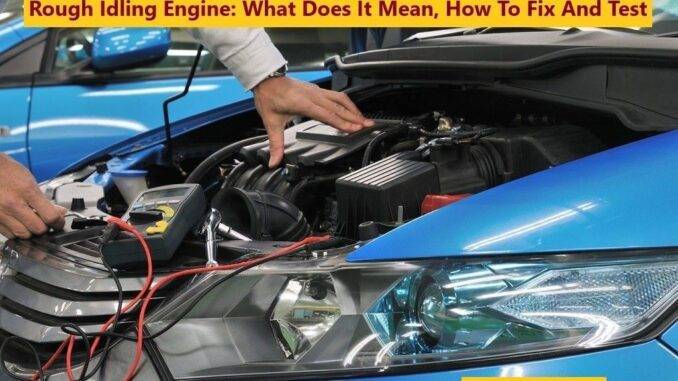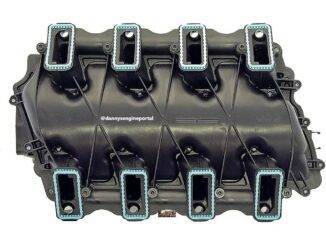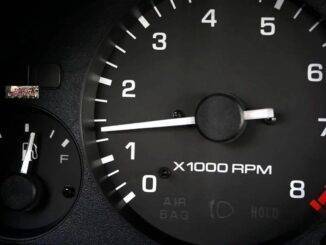
So, a rough idling engine, is a common problem, of which the exact cause, can be difficult to find.
Also, the reasons for a rough idling engine can vary. With some being cheap easy fixes, and some needing more complex repair procedures.
So, when your car is stationary your engine should idle smoothly, at around 1000 (RPM) and give off a, constant even sound.
Damaged or faulty parts in the fuel, ignition, emission and other systems, will cause a rough idling engine.
So, if your car’s idle is rough, possibly rising and falling or struggling to maintain a steady rate of rotation. Then, you have a, rough idling engine.
Above all, a smooth idle depends on, just the right mixture of fuel and air. But, there can be many possible places, where that combination, is getting unbalanced. And, it only takes a minor problem, like a fouled spark plug, to cause your engine to idle rough.
Idle problems, may start from a worn out, or failed part, or even a blown gasket. That’s why, the number of potential sources of a rough idle, can make your diagnostic a little difficult.
Always Start With Checking Your Computer, For Diagnostic Trouble Codes (DTCs)
When diagnosing a rough idling engine, there are certain things that must be done, prior to replacing parts.
So, if you have a 1981 or newer vehicle, it will most likely have, an engine management computer. The computer monitors the functions, of a number of engine parts. So, when a problem develops in a system, that is monitored by the computer. Then, codes which relate to that particular system will be set, and stay in the computer’s memory. Checking for computer codes first, is very important. Because, they may lead you to, the rough idling engine cause.
Next, Do A Visual Inspection
If you recently did some work on your engine, and soon after you noticed a rough idle. Then, make sure you didn’t leave, something unplugged, a loose vacuum hose or didn’t properly reassemble, the air cleaner. As a result, even a small air leak, can cause engine performance problems.
Mechanical Reasons For, A Rough Idling Engine
So, high mileage vehicles, are the most likely to start having, mechanical reasons for a rough idle. That’s why, the best place to start is with a Compression Test, and a Cylinder Leak Down Test.
Compression Test
Your car’s engine compression, can tell you a lot about the, overall health of the engine. So, if your car is blowing blue smoke out of the exhaust pipe, or losing oil. Then, you could have, leaking piston rings.
When a engine’s compression, is low in any particular cylinder, it will cause, a rough idling engine. And, that could trigger a check engine light (CEL). As a result, low or uneven compression, will cause a rough idling engine.
Cylinder Leak Down Test
A cylinder leak down test, is similar to a compression test. But, instead of measuring pressure, it measures pressure loss.
So, the cylinder leak down test, is an excellent way, to show where problems are, before tearing down the engine.
Listening For Where The Air Is Leaking By Ear, To Isolate The Problem:
Intake Valve
- Air whistling out of the intake manifold, carburetor or throttle body, indicates a leak, at the intake valve.
Exhaust Valve
- Air heard hissing out of the exhaust pipe, turbocharger or exhaust manifold, means an exhaust valve is leaking.
Piston Rings
- Whistling or hissing out of the (PCV) valve, oil filler cap hole or dipstick tube. Means, the air is pushing past the rings. As a result, suspect ring or cylinder wall wear.
Head Gasket
- Air bubbles in the engine coolant, seen at the radiator filler cap. Means, air is leaking into the coolant, past the head gasket.
Cracked Cylinder Head
- Bubbles in the coolant or coolant being pushed up, out of the radiator neck. Can also indicate, cracks in the cylinder head or cylinder walls.
Common Causes Why You May Have, A Rough Idling Engine:
Vacuum Leaks
- Most vehicles have a maze of hoses, which create a vacuum for both, fuel and air. In older engines with a carburetor, this vacuum, pulls the fuel into the engine. Most newer vehicles, however, have a throttle to regulate engine speed and airflow through the system.
- This also creates a vacuum, within the intake manifold. These hoses can wear out over time, and a vacuum leak may develop. As a result, too much air gets mixed with the fuel, causing a rough idling engine.
Spark Plugs
- A faulty spark plug may cause, several engine performance problems, including a rough idling engine. Furthermore, poor engine maintenance, may foul the tip with ash, oil, or carbon deposits.
Dirty Fuel Injector
- When they can’t deliver their normal dose of fuel, performance, fuel economy and emissions, are all going to suffer. Dirty injectors, cannot delivery the correct spray pattern, that is so needed for clean, efficient combustion. Sometime dirty fuel injectors, can be the root cause, of a rough idling engine.
Clogged Fuel Filter
- A clogged fuel filter, can cause similar problems. The job of the fuel filter, is to screen out contaminants in the fuel. A rough idling engine, is one symptom, of a clogged fuel filter.
Bad Mass Air Flow (MAF) Sensor
- A bad mass air flow (MAF) sensor, can be responsible for, a rough idling engine. A mass air flow (MAF) sensor, detects the amount of air, coming into the fuel injection system. Then, the computer uses that data, to deliver the proper amount of fuel, to the air in the engine.
- Over time, these sensors can go bad or become dirty. As a result, the first symptoms of a bad mass air flow (MAF) sensor, is a rough idling engine.
Dirty Oxygen (O2) Sensor
- Oxygen (O2) sensors measures, how rich or lean the gases are, as they exit the combustion chamber. So, depending on the results, the amount of fuel entering the engine is adjusted, by the vehicle computer. The ultimate goal is to maintain, an ideal mixture, that produces the lowest emissions. So, a dirty oxygen (O2) sensor, will usually trigger the check engine light (CEL). And, can lead to a, rough idling engine.
Sticking (EGR) Valve
- An (EGR) valve is designed to open, at high engine (RPM)s. The (EGR) valve, feeds a portion of the exhaust, back into the engine. As a result, reducing combustion temperatures and oxides of nitrogen emissions, the main contributor to smog.
- The (EGR) valve, is a mechanical device, that can develop carbon buildup, that prevents it from closing fully. When that happens, the (EGR) valve allows exhaust flow at idle, which causes, a rough idling engine.
Clogged Air Filter
- So, your engine needs air from the outside, to mix with the fuel, in the internal combustion chamber. There is an air filter, which prevents debris from getting, into the combustion chamber. But, if this air filter is clogged or worn out, then there will be, less clean air passing through it. This will cause, a rough idling engine.
Sticking Valves
- Carbon build up on valves, can cause them to stick. As a result, causing loss of compression.
Conclusion
So, rough idling engine issues, can be frustrating. But, with a little diagnosing, you’ll have a real chance, at figuring it out. Also, remember to always check your engine idle, with the air conditioning and defroster turned off. As with many car issues, the root cause, can either be a quick, easy, cheap fix. But, it can also be, something more serious and costly.
BY DANNY BENDER




